
Pruszków is a city in east-central Poland, capital of Pruszków County in the Masovian Voivodeship. Pruszków is located along the western edge of the Warsaw metropolitan area.
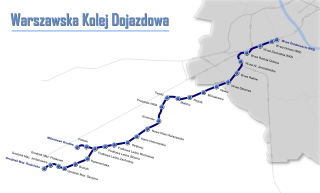
Warsaw Commuter Railway is a light rail commuter line in Poland's capital city of Warsaw. The line, together with its two branches, links Warsaw with the municipalities of Michałowice, Pruszków, Brwinów, Podkowa Leśna, Milanówek and Grodzisk Mazowiecki to the south-west of Warsaw.

Marki is a town in central Poland, in the Warsaw metropolitan area in the Masovian Voivodeship, just to the north-east of the Polish capital Warsaw.

Tworki is a district of Pruszków, a town on the outskirts of Warsaw, Poland. It is famous for the large psychiatric hospital, which opened in 1891 and is still operating to this day as a part of the Medical University of Warsaw. It is the site of one of the stations of the Warszawska Kolej Dojazdowa (WKD) commuter railway.

Warszawa Śródmieście WKD is the city terminus of the Warszawska Kolej Dojazdowa (WKD) suburban light rail line in Warsaw. It is situated in Aleje Jerozolimskie to the south-west of Warszawa Centralna railway station. The station was opened on 8 December 1963.
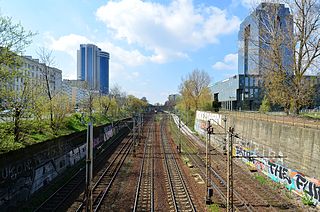
Warsaw cross-city line is a 7 km (4.3 mi) railway line crossing Central Warsaw in the east–west direction. Opened in 1933 and electrified in 1936, it initially had two tracks, with an additional two added in 1967. The central part of the line is in a tunnel, which is 2,226 m long. It then crosses the Vistula by the Średnicowy railway bridge 470.15 m long located between Poniatowski Bridge and Świętokrzyski Bridge.

Warszawa Śródmieście railway station is a railway station in Warsaw, Poland, in the district of Śródmieście. The station serves the suburban (southern) tracks of the Warsaw Cross-City Line and is used by regional trains run by Koleje Mazowieckie (KM) and Szybka Kolej Miejska (SKM). There are two side platforms and one island platform serving two tracks, all located in a tunnel.

Szybka Kolej Miejska is a mixed rapid transit and commuter rail system in the Warsaw metropolitan area, operated by the city owned company Szybka Kolej Miejska Sp. z o.o. under the management of Public Transport Authority in Warsaw on shared, general railway lines managed by the PKP Polskie Linie Kolejowe.
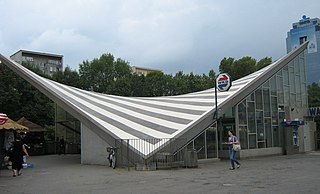
Warsaw Ochota is a railway station in Warsaw, Poland, located in the district of Ochota at Plac Zawiszy on the corner of Aleje Jerozolimskie and Towarowa Street. The station lies in a cutting. It has two island platforms, one on the suburban tracks of the Warsaw Cross-City Line for the regional trains run by Koleje Mazowieckie and Szybka Kolej Miejska and one for the Warszawska Kolej Dojazdowa light railway. The station building, at the street level, was constructed in 1963: it has a saddle roof in a distinct shape of a hyperbolic paraboloid. It was including escalator then. The location allows for convenient interchange with city trams and buses serving the western part of the city centre.

Masovian Railways, in Polish Koleje Mazowieckie, is a regional rail operator in the Masovian Voivodeship of Poland.

Komorów is a village in the administrative district of Gmina Michałowice, within Pruszków County, Masovian Voivodeship, in east-central Poland. It lies approximately 3 kilometres (2 mi) south-east of Pruszków and 15 km (9 mi) south-west of Warsaw.
Reduta is a Czech word meaning a masquerade ball, a building with a dance hall or a part of Baroque fortification. It may refer to:
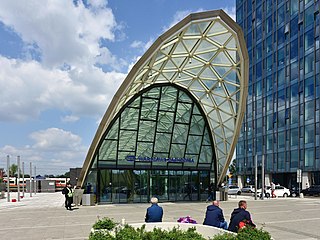
Warszawa Zachodnia station, in English Warsaw West, is a railway and long-distance bus station in Warsaw, Poland on the border of Ochota and Wola districts. The railway station is the westernmost terminus of the Warsaw Cross-City Line. It serves trains from PKP Intercity, Polregio, Koleje Mazowieckie, Szybka Kolej Miejska and Warszawska Kolej Dojazdowa as well as international trains passing through Warsaw. It is one of the busiest railway stations in Poland, with over 800 daily trains.

Warszawa Włochy railway station is a railway station in the Włochy district of Warsaw, Poland. It stands on the junction of lines 1 and 3: from here trains can either run on Line 1 towards Łódź or Line 3 towards Poznań. It comprises two platforms connected by an undeground pedestrian tunnel and a station building complete with ticket machines and bicycle parking.
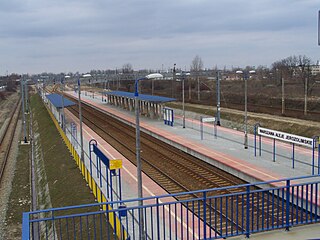
Warszawa Aleje Jerozolimskie railway station is a railway station in the Ochota district of Warsaw, Poland. The station is built on a viaduct of Aleje Jerozolimskie. It handles trains from Warszawska Kolej Dojazdowa, from Warszawa Śródmieście WKD to Grodzisk Mazowiecki Radońska and Milanówek Grudów, and Koleje Mazowieckie, from Warszawa Wschodnia via Radom to Góra Kalwaria and Skarzysko Kamienna. The platforms for the Warszawska Kolej Dojazdowa were built in 1974 as part of the realignment of the route into central Warsaw. The platforms for Koleje Mazowieckie trains were added in 2008.
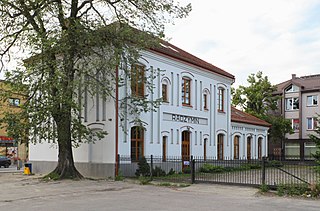
Marecka Kolej Dojazdowa was a narrow gauge railway in Poland connecting Warsaw with Marki and Radzymin, it operated from 1896 to 1974. Originally built to 800 mm gauge, it was regauged to 750 mm in 1951.
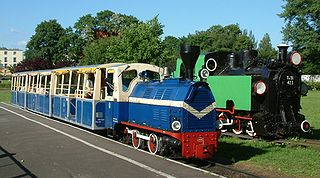
There are hundreds of kilometres of 600 mm, 750 mm, 785 mm, and 1,000 mm narrow-gauge lines in Poland. The metre-gauge lines are mostly found in the northwest part of the country in Pomerania, while 785 mm lines are found only in the Upper Silesia region. 750 mm is the most commonly used narrow gauge; it is used, for example, in the Rogów Narrow Gauge Railway and in Tarnowskie Góry with the world's oldest narrow-gauge railway in continuous service since 1853. Some narrow-gauge lines in Poland still operate as common carrier, while others survive as tourist attractions. One of the finest of the latter is the 600 mm narrow-gauge railway running from Żnin via Wenecja and famous Biskupin to Gąsawa in the Pałuki region. Railway traditions of Pałuki date back to July 1894 when the first two lines were opened.

Łódź Retkinia is a commuter railway station in the Polish city of Łódź, in Polesie district, on the outskirts of the Retkinia housing neighbourhood. The station is located on the Łódź-Tuplice railway between Łódź Kaliska and Łódź Lublinek stations.

The Piaseczno and Grójec Narrow-gauge Railway, until 2004 known as the Grójec Commuter Railway is the tourist narrow-gauge railway service in Warsaw, Poland, operated by the Piaseczno–Grójec Narrow-Gauge Railway Society, with the metre-gauge railway line. It was originally opened in 1900, and operated as a local transit railway line in Warsaw and it suburbia. Currently, most of the historical lines has been closed, with the remaining stations serving as a tourist attraction.



















